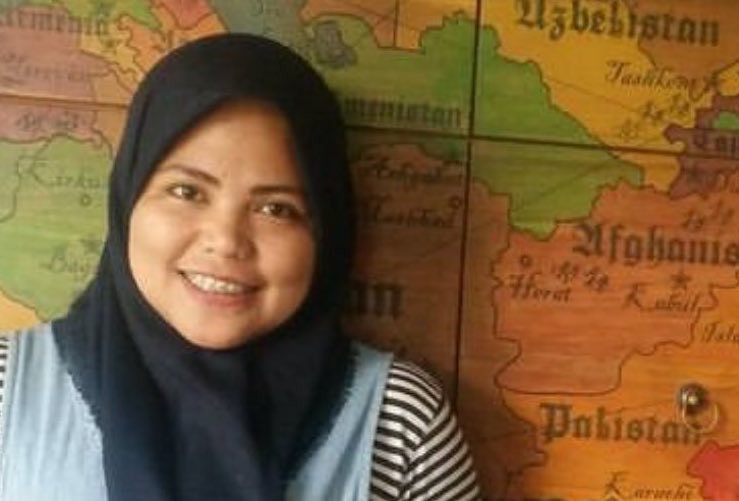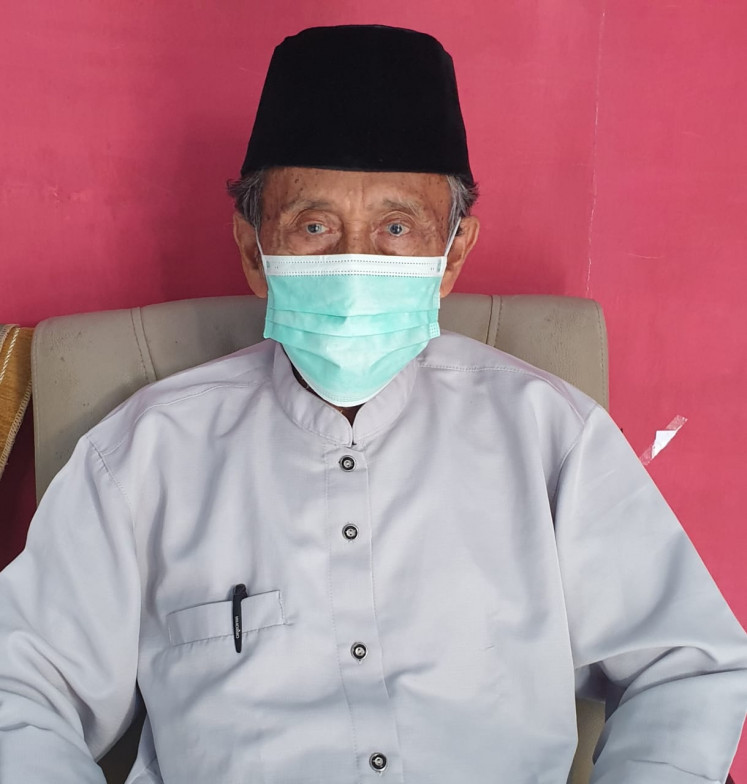Popular Reads
Top Results
Can't find what you're looking for?
View all search resultsPopular Reads
Top Results
Can't find what you're looking for?
View all search resultsMakassar cathedral bombing raises doubts about city’s religious tolerance
Following a suicide bomb attack at a cathedral in Makassar that left around 20 people wounded, residents and former residents of the biggest eastern Indonesian city assess the state of religious tolerance.
Change text size
Gift Premium Articles
to Anyone
M
himi, 38, was getting ready go to her office when she heard about the suicide bomb attack outside the Sacred Heart Cathedral of Makassar. It was Sunday, and her company had ordered all employers to take a COVID-19 rapid test following a period of working remotely.
“The [church] is not far from my office,” said Mhimi, adding that she was shocked and could not fathom why a terrorist attack would happen during a pandemic.
Mhimi, a Muslim, said she hoped the cathedral attack would be the last one in Makassar and in the world. Suicide bombings, she said, would not impact interreligious harmony between people, and life would go on as usual after each attack.
“Whatever goals these people have, hopefully they will realize that suicide bombing is useless and ineffective,” she added.
A Palm Sunday service was being conducted inside the cathedral when the bombing occurred. Around 20 people were wounded, while the two suicide bombers – a couple – died at the scene.
Sari, 31, an Indonesian of Chinese descent who hails from Makassar but now lives in Jakarta, said she was not particularly surprised about the attack. She noted that similar attacks in the past had occurred during particular religious celebrations.
“The only difference is that, this time, the attack took place at a location I personally know. I was like, ‘Oh, no! Hopefully there are no victims, and even if there are victims, hopefully they are only wounded. I hope nobody I know was there,’” said Sari, who was born and raised in Makassar until she was 28.
Rendra, 41, who lives in Depok, West Java, and is also from Makassar, said he was baffled by the timing of the bombing but not by the attack itself. “I could see it coming,” he said.
Signs of religious intolerance?
The attackers, later identified as newlyweds, were members of extremist group Jamaah Ansharut Daulah (JAD). In January, police had arrested 20 members of the group on suspicion of terrorism. The JAD was previously blamed for several attacks, including the 2018 suicide bombings at three churches in Surabaya, East Java.
The Surabaya attacks were the last church bombings in Indonesia prior to the Makassar attack.
Muammar Bakry, dean of the School of Sharia and Law at Alauddin State Islamic University (UIN) of Makassar, said the cathedral attack did not reflect religious intolerance in the city.
“It was an individual act,” said Bakry, also the chairman of the South Sulawesi chapter of the Counterterrorism Coordination Forum (FKPT).
Bakry admitted, however, that there was a rising number of radical groups in universities and that this phenomenon was not exclusive to Makassar. He called on universities to ensure that all Quran reading groups on campuses promote moderate teachings and not the extreme ones.
Muammar Bakry, the dean of Faculty of Sharia and Law at the Alauddin State Islamic University (UIN) of Makassar, said that the cathedral attack did not reflect religious intolerance in the city but admits there is a rising number of radical groups in universities. (JP/Courtesy of Muammar Bakry)“Religious teachers should provide sermons that are calming and [include] moderate [teachings],” he said, adding that the sermons should be conducted online as well amid the increasing number of social media users.
M. Qasim Mathar, who runs the Matahari Islamic Boarding School in Dusun Mangempang, Moncongloe, Maros, expressed a different view when asked about the matter. He emphasized that people needed to accept that suicide bombers believed that what they did was part of religious teachings.
“The suicide bomb attack shows the ineffectiveness, if not failure, of ulemas, Islamic teachers and lecturers in spreading teachings that are inclusive and moderate,” he said.
Qasim added that the level of tolerance between people with different views in Makassar was not satisfactory. He noted political debates following the last presidential election and said hatred against people of other ethnic, religious or societal groups could still be seen in social media posts and WhatsApp groups of Makassar residents.
“It has become more intense following the suicide bombing,” he said.
Hard pill to swallow
Having grown up in a non-Muslim-majority neighborhood, Mhimi said she was used to interreligious relations from an early age on and believed there was a decent level of religious tolerance in Makassar.
“Fights between people of different religious traditions or people of different ethnic backgrounds hardly ever occurred in the city,” she said.
Mhimi added that, following the cathedral attack, there were no frictions between her and her friends of other religions.
“Perhaps it’s because we all realize that what the suicide bombers did was not something that a religious person would do. Such actions do not represent any religious traditions,” she said.
Tabayyun, 24, who works as a news reporter in Antang, Makassar, disagreed with Mhimi. He insisted that the city’s religious tolerance was poor said this had to be acknowledged.
“This is a hard pill to swallow, because people don’t like to admit fault,” said Tabayyun, who found out about the bombing on Twitter. “However, the reality is that the religious tolerance in Makassar is still low.”
He cited some examples, such as bakeries in Makassar refusing to sell cakes with ‘Merry Christmas’ written on them. In addition, Tabayyun observed that, even before the COVID-19 pandemic, churchgoers in Makassar could not observe Christmas in peace because they needed police protection to ensure their safety.
“Police officers also need to protect some stores that sell Christmas supplies from mass organizations,” he said.
Tabayyun disagreed with the notion that terrorists committing attacks did not have a religion.
“[For me], the terrorists did have a religion, but their interpretation was too extreme,” he said.
M. Qasim Mathar, who runs Matahari Islamic Boarding School in Dusun Mangempang, Moncongloe, Maros, said that people needed to accept that suicide bombers believed that what they did was part of religious teachings. (JP/Courtesy of M. Qasim Mathar)Rendra said people of different faiths and beliefs had lived harmoniously in Makassar until 1998. Before that year, he said, it had not been uncommon for Muslim households to send dishes and cookies to their non-Muslim neighbors.
“However, the anti-Chinese sentiment following the [May] 1998 riot has significantly expanded the gap between people of different races, ethnicities and religions. At the same time, there is a rising number of religious extremists,” said Rendra, who suspected that the bombing attack had been planned before the pandemic hit last year.
Sari, a Chinese Indonesian and nonpracticing Buddhist, said that, as a child, she would experience racial slurs, especially during the 1997 anti-Chinese riot in Makassar, where five people died. The riot was triggered by the death of a 9-year-old girl who was murdered by a Chinese Indonesian who suffered mental illness.
Sari said the discrimination she had felt was between so-called pribumi [native Indonesians] and non-pribumi.
“When I was in elementary school, whenever I walked outside my house, someone would scream ‘Hey Cina [Chinese]! Go home to your country!’ and I was used to it,” she said.
However, in the past five or 10 years, Sari felt, there had been a shift from racial discrimination to discrimination based on religion.
“[I’ve heard now that] many Muslims [in Makassar] refuse to shake hands with non-Muslims. There are terms such as ‘noni’ or ‘Non-Islam’ that are used to refer to non-Muslims at colleges,” she added.
Most of Sari’s friends who are Muslims follow moderate Islamic teachings, and so far there are no frictions between them, nor did she ever feel any form of intolerance.
“As for the extremists, well, they already separate themselves [from society], so I’ve never had the chance to befriend them,” she said, chuckling.












